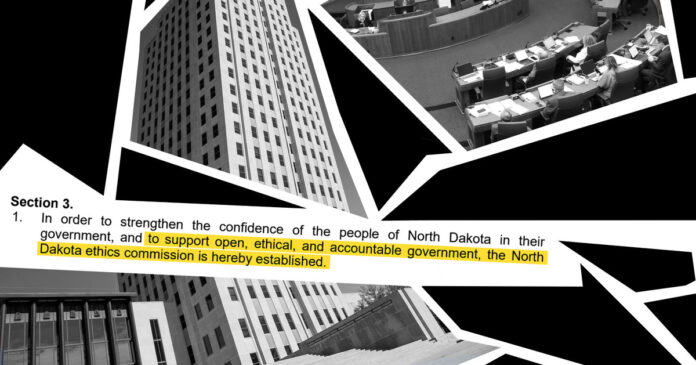“North Dakota’s Uphill Battle for Ethics Reform: The Fight for Accountability and Transparency”
The state of North Dakota has been grappling with the effectiveness of its Ethics Commission, established six years ago after a constitutional amendment was passed by fed-up citizens, led by a group of women known as the BadAss Grandmas. The goal of the commission was to investigate and prevent unethical conduct by public officials. However, a recent investigation by the North Dakota Monitor and ProPublica has revealed that the commission has not been as successful as advocates had hoped.
Since its inception, the commission has received 81 complaints but has not substantiated any of them. Many complaints were dismissed because the commission lacked the authority to investigate them, and some are still pending for over a year. The commission’s executive director mentioned that numerous tips go uninvestigated because formal complaints are required, and complainants fear retaliation if they file one.
North Dakota was one of the last states to establish an ethics oversight agency, and the legislature plays a significant role in funding and governing the commission’s operations. Lawmakers have consistently provided less funding than estimated, leading to budget constraints and limitations on the commission’s investigative powers. The legislature has also restricted the types of complaints the commission can investigate and hindered its oversight of lawmakers.
Efforts are underway to push for the largest package of ethics-related legislation in recent history during the upcoming legislative session. Proposed reforms include measures to expedite investigations, allow the commission to investigate alleged wrongdoing without a formal complaint, and enhance transparency. However, lawmakers have already shown resistance to some of these reforms.
The commission’s slow progress is evident in cases like that of state Rep. Emily O’Brien, who faces allegations of pushing legislation on behalf of her employer and voting on bills in which she had a financial interest. The commission took seven months to move forward with the investigation, during which O’Brien won a contested primary and was reelected.
The commission’s limitations in investigating certain government officials, restrictions on anonymous complaints, and inability to investigate criminal conduct have hindered its effectiveness. The commission has also faced challenges in issuing advisory opinions and resolving conflicts of interest cases.
As the new legislative session begins, the Ethics Commission is advocating for reforms to address these challenges, including new financial disclosure requirements, whistleblower protections, and enhanced investigative powers. The commission is requesting a budget increase to hire additional staff and improve its operations. However, lawmakers’ responses to these proposed reforms remain uncertain, with some expressing skepticism and resistance to the commission’s authority.
Overall, the North Dakota Ethics Commission faces an uphill battle in fulfilling its mandate to promote open, ethical, and accountable government in the state. The ongoing debate between the commission and lawmakers highlights the challenges of establishing effective ethics oversight in a political landscape where interests often clash.
